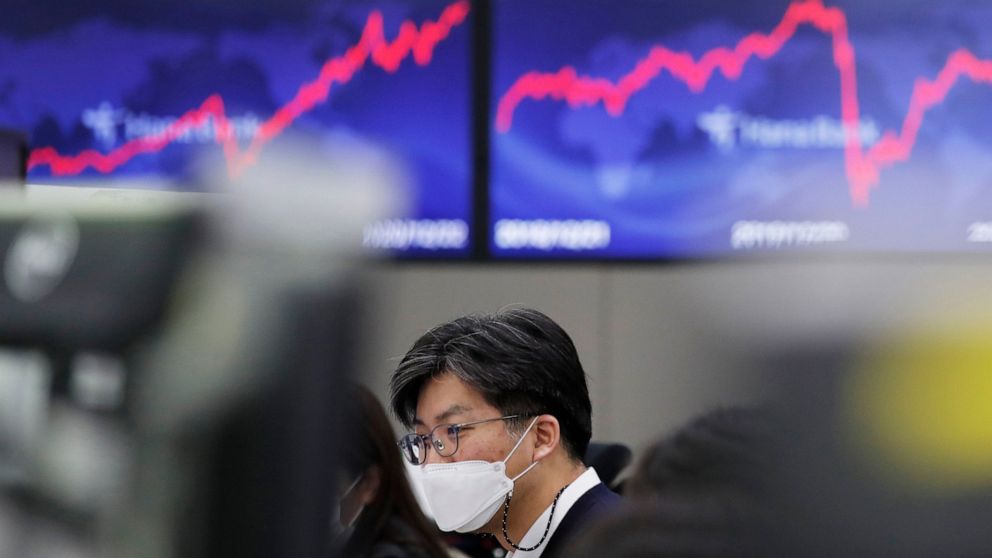Global stocks gain after Trump criticizes economic aid bill
Global stock markets are higher after President Donald Trump suggested he may veto a $900 billion economic aid package
BEIJING — Global stock markets rose Wednesday after President Donald Trump suggested he may veto a $900 billion economic aid plan and the World Bank said it expects China to eke out 2% growth this year and accelerate in 2021.
London and Frankfurt opened higher and Shanghai, Tokyo and Hong Kong rose in light trading ahead of this week’s Christmas holiday.
Overnight, Wall Street’s benchmark S&P 500 index lost 0.2% after Trump criticized the aid plan approved by Congress. He urged lawmakers to raise payments to the public.
Investors might believe “Trump is bluffing” or that if he vetoes the plan, Congress can override him, said Jeffrey Halley of Oanda in a report.
That “may be complacent” because legislators are leaving Washington, but “markets appear to be holding off pressing the sell button until the situation clarifies,” said Halley.
Meanwhile, investor nerves were rattled by the emergence of a new coronavirus variant in Britain that spreads more easily. That has prompted some 40 governments to ban travelers from Britain.
In early trading, the DAX in Frankfurt gained 0.5% to 13,486.48 and the CAC 40 in France added 0.2% to 5,480.69. The FTSE 100 in London was down 0.2% at 6,436.15.
On Wall Street, the futures for the S&P 500 and the Dow Jones Industrial Average were up 0.2%.
On Tuesday, the S&P 500 declined 0.2% and the Dow lost 0.7%.
About 65% of the companies in the S&P 500 fell. Communication services, financial and other companies accounted for much of the selling. Tech companies rose.
The Nasdaq composite rose 0.5% to a record.
In Asia, the Shanghai Composite Index rose 0.8% to 3,382.32 and the Nikkei 225 in Tokyo added 0.3% to 26,524.79. The Hang Seng in Hong Kong gained 0.8% to 26,328.89.
The Kospi in Seoul advanced 1% to 2,759.82 and Australia’s S&P-ASX 200 was 0.7% higher at 6,643.10.
India’s Sensex rose 0.7% to 46,345.60. New Zealand, Singapore and Bangkok advanced while Indonesia declined.
Investors are hoping the aid package approved by Congress after months of wrangling can prop up the economy until the rollout of coronavirus vaccines allows business and consumer activity to revive.
The plan approved Monday would send $600 to most Americans, give $300 per week to the unemployed and deliver other aid to businesses.
Trump, however, complained on Twitter that the measure did too little for ordinary Americans and, possibly referring to foreign aid provisions, too much for other countries.
Trump urged legislators to increase payments to as much as $4,000 per couple and “get rid of the wasteful and unnecessary items from this legislation and to send me a suitable bill.”
Also Wednesday, the World Bank said it expects China’s economy to grow by 2% this year over 2019 and to accelerate to 7.9% in 2021. China is the only major economy on track to grow this year while activity in the United States, Europe and Japan shrinks.
“Economic activity in China has normalized faster than expected, aided by an effective pandemic-control strategy, strong policy support and resilient exports,” the World Bank said in a report.
Even without the new coronavirus variant, the resurgent pandemic has been dragging on the U.S. economy.
Two reports Tuesday added to discouraging data.
One showed consumer confidence fell more than expected this month. Another showed the red-hot housing market is slowing.
In energy markets, benchmark U.S. crude lost 38 cents to $46.64 per barrel in electronic trading on the New York Mercantile Exchange. The contract fell 72 cents on Tuesday to $47.02. Brent crude, the basis for pricing international oils, declined 34 cents to $49.82 per barrel in London. It shed 83 cents the previous session to $50.08 a barrel.
The dollar declined to 103.46 yen from Tuesday’s 103.67. The euro gained to $1.2180 from $1.2161.
![]()


